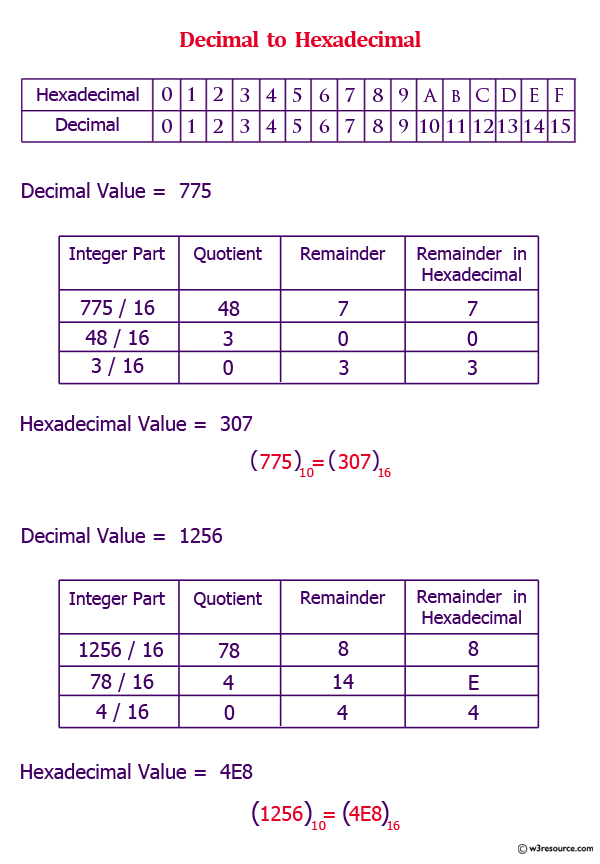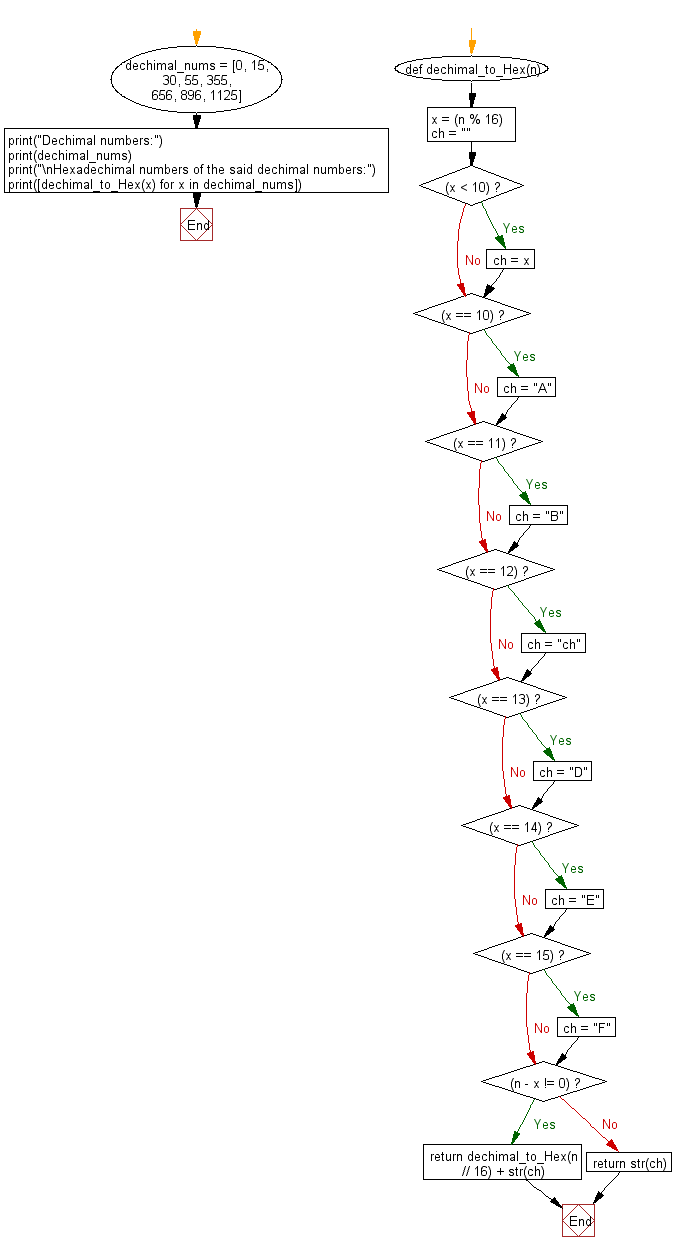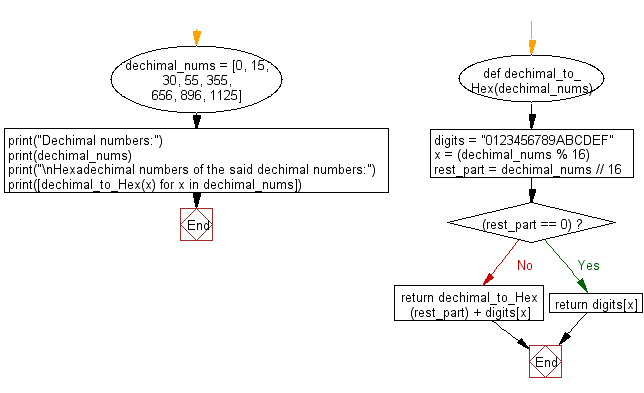Python: Convert decimal to hexadecimal
Decimal to Hexadecimal
Write a python program to convert decimal to hexadecimal.
Sample decimal number: 30, 4
Expected output: 1e, 04
Pictorial Presentation:

Sample Solution-1:
Python Code:
# Define an integer variable 'x' with the value 30.
x = 30
# Print the hexadecimal representation of 'x' with leading zeros.
# The 'format' function is used with the format specifier '02x' to format 'x' as a 2-character lowercase hexadecimal string.
# It ensures that there are leading zeros to make it 2 characters long.
print(format(x, '02x'))
# Define an integer variable 'x' with the value 4.
x = 4
# Print the hexadecimal representation of 'x' with leading zeros.
# The 'format' function is used with the format specifier '02x' to format 'x' as a 2-character lowercase hexadecimal string.
# It ensures that there are leading zeros to make it 2 characters long.
print(format(x, '02x'))
Sample Output:
1e 04
Sample Solution-2:
Python Code:
# Define a function 'dechimal_to_Hex' that converts a decimal number to hexadecimal.
# The function takes an integer 'n' as input.
def dechimal_to_Hex(n):
# Calculate the remainder when 'n' is divided by 16.
x = (n % 16)
# Initialize an empty string 'ch' to store the hexadecimal character.
ch = ""
# Check the value of 'x' to determine the corresponding hexadecimal character.
# For values 0-9, use the integer itself. For values 10-15, use the letters 'A' to 'F'.
if (x < 10):
ch = x
if (x == 10):
ch = "A"
if (x == 11):
ch = "B"
if (x == 12):
ch = "C"
if (x == 13):
ch = "D"
if (x == 14):
ch = "E"
if (x == 15):
ch = "F"
# Check if there are more digits in the number to convert.
if (n - x != 0):
# Recursively call 'dechimal_to_Hex' to convert the remaining digits and append the current hexadecimal character 'ch'.
return dechimal_to_Hex(n // 16) + str(ch)
else:
# If there are no more digits to convert, return the hexadecimal character 'ch'.
return str(ch)
# Define a list of decimal numbers 'dechimal_nums'.
dechimal_nums = [0, 15, 30, 55, 355, 656, 896, 1125]
# Print the original decimal numbers.
print("Decimal numbers:")
print(dechimal_nums)
# Convert and print the hexadecimal representations of the decimal numbers using the 'dechimal_to_Hex' function.
print("\nHexadecimal numbers of the said decimal numbers:")
print([dechimal_to_Hex(x) for x in dechimal_nums])
Sample Output:
Dechimal numbers: [0, 15, 30, 55, 355, 656, 896, 1125] Hexadechimal numbers of the said dechimal numbers: ['0', 'F', '1E', '37', '163', '290', '380', '465']
Flowchart:

Sample Solution-3:
Python Code:
# Define a function 'dechimal_to_Hex' that converts a list of decimal numbers to hexadecimal.
# The function takes a list of decimal numbers 'dechimal_nums' as input.
def dechimal_to_Hex(dechimal_nums):
# Define a string 'digits' containing hexadecimal digits.
digits = "0123456789ABCDEF"
# Initialize 'x' with the remainder when 'dechimal_nums' is divided by 16.
x = (dechimal_nums % 16)
# Calculate the integer division of 'dechimal_nums' by 16 and store it in 'rest_part'.
rest_part = dechimal_nums // 16
# Check if 'rest_part' is zero.
if (rest_part == 0):
# If there is no remainder, return the hexadecimal digit corresponding to 'x'.
return digits[x]
# If 'rest_part' is not zero, recursively call 'dechimal_to_Hex' with the 'rest_part' and append the hexadecimal digit corresponding to 'x'.
return dechimal_to_Hex(rest_part) + digits[x]
# Define a list of decimal numbers 'dechimal_nums'.
dechimal_nums = [0, 15, 30, 55, 355, 656, 896, 1125]
# Print the original decimal numbers.
print("Decimal numbers:")
print(dechimal_nums)
# Convert and print the hexadecimal representations of the decimal numbers using the 'dechimal_to_Hex' function.
print("\nHexadecimal numbers of the said decimal numbers:")
print([dechimal_to_Hex(x) for x in dechimal_nums])
Sample Output:
Dechimal numbers: [0, 15, 30, 55, 355, 656, 896, 1125] Hexadechimal numbers of the said dechimal numbers: ['0', 'F', '1E', '37', '163', '290', '380', '465']
Flowchart:

For more Practice: Solve these Related Problems:
- Write a Python function to convert a hexadecimal number back to decimal.
- Write a Python program to convert a list of decimal numbers into hexadecimal format.
- Write a Python function to format hexadecimal numbers with a minimum of four digits.
- Write a Python program to find the sum of two hexadecimal numbers given as strings.
Go to:
Previous: Write a Python program to convert an integer to binary keep leading zeros.
Next: Write a Python program to check if every consecutive sequence of zeroes is followed by a consecutive sequence of ones of same length in a given string. Return True/False.
Python Code Editor:
What is the difficulty level of this exercise?
Test your Programming skills with w3resource's quiz.
